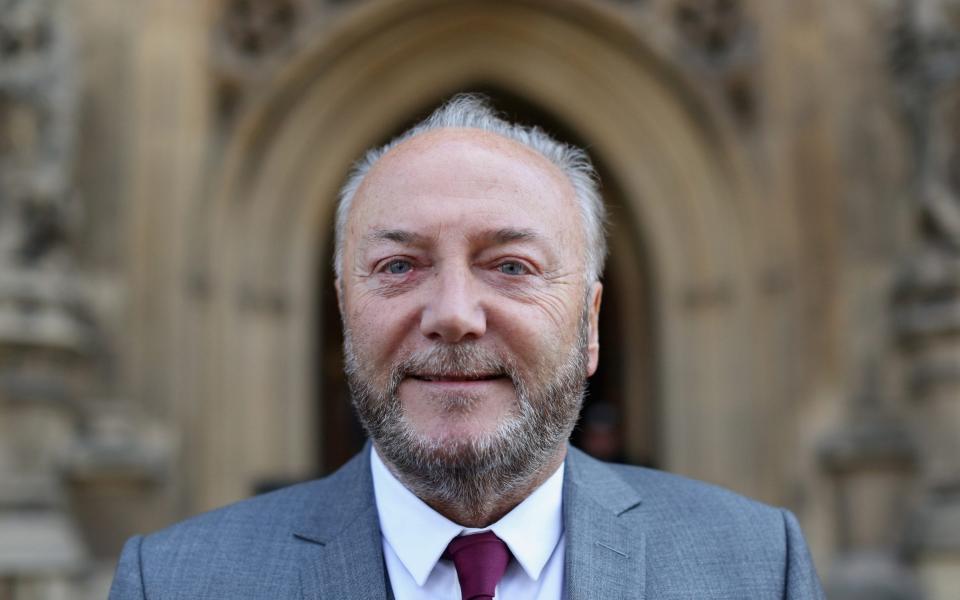Galloway's pro-UK party 'could cost unionists eight seats', Tory strategists fear

George Galloway’s plan to return to politics by persuading Unionists to vote for his latest outfit risks costing established anti-independence parties up to eight Holyrood seats, Tory strategists believe.
A poll at the weekend suggested that the former Labour and Respect Party MP is within reach of winning a Holyrood list seat under the All For Unity (AFU) banner, which is adopting a ‘second vote’ strategy by standing candidates only on regional lists.
The party has claimed that the poll, which put AFU at four per cent nationwide, showed it has the potential to pick up further support before election day and deliver unionist seats across Scotland.
George “I’ll work with any unionist party” Galloway blocking me tells you everything you need to know about this utter charlatan.
He is no friend of the union. All4Unity is simply his latest vanity trip to rescue his failed political career. pic.twitter.com/TB03k5l64x— Jackson Carlaw (@Jackson_Carlaw) April 4, 2021
However, Tory strategists believe that Mr Galloway’s fringe outfit is far more likely to end up costing established pro-UK parties seats, by draining votes from them, while failing to win enough support to elect any of its own candidates.
Douglas Ross, the Scottish Tory leader, on Monday claimed Mr Galloway was a “tool for the nationalists”.
An internal analysis carried out by Conservative strategists found that if the four per cent result was repeated on election day, it would cost the Tories several seats while Labour would also be damaged.
"With four per cent support, they would cost us five or six seats,” a party source said. “Their support is coming disproportionately from us.”
Regional seats are allocated to parties under a calculation that takes into account results in constituencies, under a system designed to make the final result more proportional.
The Tories were allocated the final list seats in Central Scotland and the south of Scotland in 2016 but the analysis shows these would both have gone to other parties had AFU stood and won four per cent. Labour would lose two list seats under the scenario.

The Tory source added: "That's before you take into account Alba on the list, which increases the competition for the remaining seats. It's a double whammy."
Alex Salmond has adopted a similar strategy to AFU but aimed at pro-independence voters, urging them to back the SNP in constituencies while backing his new Alba Party with their second vote.
Another senior Conservative insider said: "The most likely scenario in the south of Scotland is Galloway will take out a Tory, not get elected and put a Green nationalist in instead."
Professor Sir John Curtice, Scotland’s leading pollster, said the recent poll showed “some signs of life” for AFU, particularly in the South of Scotland region where Mr Galloway is standing. His analysis showed Mr Galloway would be returned as the sole AFU MSP.
However, he said the result should come with an “absolute health warning”.
“If you were to take the collection of polling we've had so far, one would have to say it's not clear this party is going to do particularly well,” Sir John said.
We are a unionist party. We believe in the Union. More importantly we are the best people to fight for it as long as we have breath. And after us our sons and daughters. @Alliance4Unity
— George Galloway (@georgegalloway) April 5, 2021
He also backed the claim that the strategy could backfire if AFU fell below the six per cent threshold in regions to pick up list seats, having taken votes from more established Unionist parties.
“The risk with these strategies is you end up with, let's say, four per cent of the vote,” he said. “You don't get in anywhere, but you take four per cent of the vote away from parties that might actually need your the list vote.”
The leader of AFU, Jamie Blackett, attacked the “defeatism and poverty of ambition” of the Conservative strategy and claimed the party’s support could rise to “14 per cent, or even higher” by May 6.
He said: “We are not the vote splitters. The vote splitters are the three main unionist parties who are refusing to stand down candidates who have absolutely no hope of winning in constituencies.
“The Tories have spent the last few days indulging in a self-centred attack on All For Unity when they could have been attacking the SNP.”

 Yahoo News
Yahoo News 